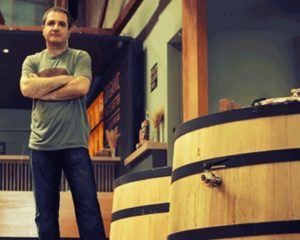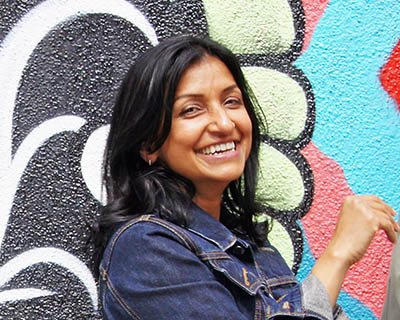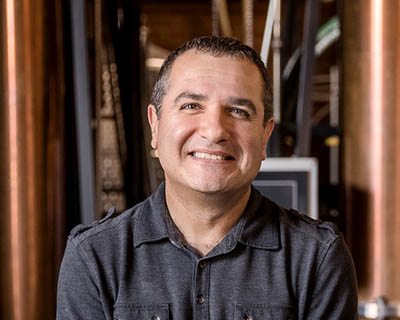CRAFTED — THE GREENBAR DISTILLERY MAKER STORY

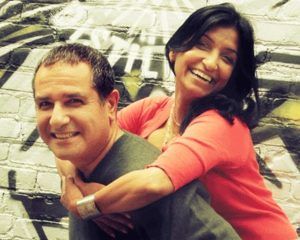
YOU BE THE JUDGE.
Meet Melkon Khosrovian and Litty Mathew, Greenbar Distillery Founders and Spirit Makers
When Melkon and Litty met in graduate journalism school at USC, their bright, young eyes locked over a spilled cup of cafeteria coffee, and making liquor was not on the radar. Not even on the radar’s radar. They were headed to the bright lights of network TV news or New York magazines.
Melkon: I dropped my coffee on the first day of class and Litty was the only one who came to my rescue.
Litty: Still do.
Melkon: I liked her.
Litty: Still does.
That was more than twenty years ago. But journalism wasn’t what the “spirits” had in mind. Nope. They were destined to stay in Los Angeles, because once they’d met, they couldn’t leave each other. They tried hard, though, splitting up more than thirty times before realizing they couldn’t break orbit.
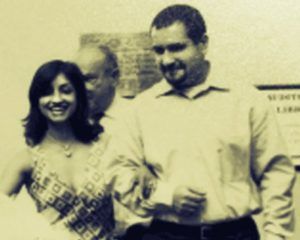
Litty: I moved to Paris to go to cooking school.
Melkon: I started a financial tech company.
Litty: But we missed each other and after a few months, reunited in Los Angeles. This time, for good.
Plato tells a story of the Other Half which Melkon and Litty like to paraphrase and possibly get wrong: in the beginning, humans were powerful and shaped like balls — with four hands and feet, two faces, two genitalia. But these humans were also arrogant and decided to challenge the gods. Zeus wasn’t about to put up with that. To lessen their influence, he cut them in half. Since their natural form had been destroyed for eternity, the two parts continue to wander the earth, looking for their matching half. This yearning to be whole again we call love.
So Melkon and Litty matched up their halves and (finally) got engaged. This is where their craft spirits odyssey begins.

Melkon: I was born in Armenia, a former Soviet Republic and immigrated to Rhode Island when I was 11. I was five years old when my grandfather gave me my first taste of liquor on New Year’s Eve. I didn’t make it to midnight.
To celebrate our coupledom, our families threw elaborate dinner parties. My side of the family set the table with fabulous mezze appetizers and a selection of high-proof fruit brandies and Eastern European vodkas. A family elder would say a poetic toast and everyone would drain their shot glasses. All except one of us.
Litty: Yeah. Who likes the taste of nail polish remover?
Melkon: True — traditional Armenian toasting spirits can be an acquired taste. But it’s impolite in our culture not to drink when someone toasts your good fortune. That’s when I got the idea. What if I made something your well-traveled cooking school palate would like?
Litty: I remember that. You’d follow me to the Hollywood Farmers’ Market and buy fresh ingredients.
Melkon: Yup. Grapefruit, thyme, lavender, apples and kumquats — anything with great aroma and flavor.
Litty: Back in Armenia, Melkon’s grandparents turned excess fruits like apricots and mulberries into a high-proof brandy, so making liquor wasn’t a leap for him. Melkon started making really interesting infusions by watching the way I cooked: fresh ingredients, layering flavors, tasting and adjusting. He became obsessed with using the flavor of real food in his infusions. When he deemed his concoctions done, he’d pour them into pretty bottles with gorgeous labels he’d designed. Off we’d go the family events with a bottle in hand.
Melkon: Turned out you weren’t the only one who loved this take on flavor. My cousins would steal the bottles. Then their friends would call us because they wanted to expand their own home bar selection. And then people we didn’t know started calling our home to ask for our spirits.
Litty: We could manage making spirits after work but soon it got a little too big to handle and our choice became clear: either unlist our phone number or go into business. In the end, it was an easy and happy choice.
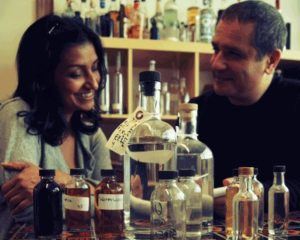
For the first couple of years, Litty and Melkon did everything themselves. Monday and Tuesday, they’d start batches. Wednesday and Thursday, they’d drive around selling. Friday, they’d bottle.Saturday and Sunday, their friends and family would help prep for the next week.
Litty: In the early days, we threw a few crazy-fun parties where we moved all the furniture out of our duplex into our neighbor’s place (who happened to be Melkon’s cousin). Then we gave each room a seasonal theme, replete with decorations. The flavors of our infused spirits corresponded with the seasons: apple, pear, nuts for winter, fresh herbs for spring, etc. Guests would rate the flavors they tried. If they loved a particular flavor, they could get a cocktail made with the appropriate spirit at a makeshift bar set up in the kitchen, manned by our brothers-in-law. These parties made us quite popular 🙂 and gave us a great deal of information about what people liked and found useful.
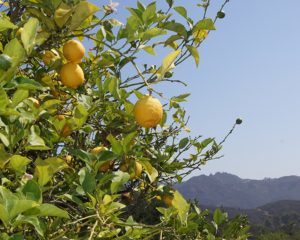
One day, they made a batch of chocolate orange vodka that tasted different. (Don’t run out for it. Greenbar Distillery no longer make it.) Here’s how it went:
Melkon: Does this batch smell orange-ier to you?
Litty: Define orange-ier?
Melkon: You know. Orange-ier.
Litty: Now that you mention it, it tastes different. Bolder. Brighter. Vivid. Orange-ier!
Turned out one of their growers had harvested a grove that was certified organic. He was getting older and wanted to leave his farmland as a legacy to his grandkids. The soil and trees were free from artificial pesticides, synthetic fertilizers and GMOs (genetically modified organisms). This meant tastier, more aromatic fruit and healthier land and water. But why did this produce more flavor?
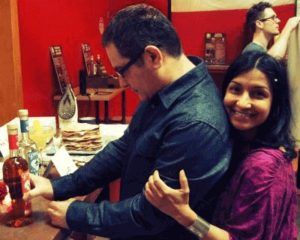
This was a big discovery. Overnight (you can do that when it’s just the two of you), they decided to use only organic ingredients. And Melkon and Litty started a new brand to focus on showcasing their new spirits. In a year, Greenbar Distillery took over sales from Modern Spirits, the original brand.
Litty: Yeah, it was painful to kill our favorite products but we knew this is what we had to do.
Melkon: We couldn’t ignore that organic simply tastes better. We owed it to our customers.
As they talked to more farmers and growers, they learned how important organic practices were for keeping land, water, and air cleaner, as well. You can’t have one without the other. Melkon and Litty took those concerns to heart and examined all their practices. They got rid of the heavy glass and chose 100% post-consumer recycled paper for their labels with water-soluble inks. Whatever practical steps they could take, they took.
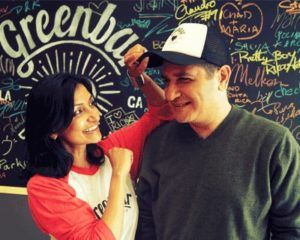
Melkon: Do you remember what made us choose TRU for our first line of organic spirits?
Litty: *Whispers* Not really. But we can’t tell people that
Melkon: Wait… I do. We came up with TRU before we came up with Greenbar Distillery. In San Francisco.
Litty: Oh, yeah! In that hotel elevator. That’s the moment we decided to make an organic vodka line. To throw caution to the wind and go for it.
A year later, in 2009, they started making other organic spirits [link to product page]. First came the liqueurs, then the rums. They knew they needed a name that stood for all the things in which they believed. A portfolio of flavorful, clean spirits to stock a great bar. A commitment to find the best ingredients. Everything packaged responsibly. But something was missing. They wanted to give back for the things they were taking.
Melkon: In Armenia, we plant a tree when a child is born.
Litty: We thought it would be the right gesture to plant a tree for every bottle we sold. To give back, not just take.
Melkon: Since then, we’ve planted more than half a million trees.
And that’s where the name Greenbar originates.
While Melkon and Litty started out in Monrovia in 2004, they were forced to move in 2010 due to a fast train heading their way. Literally. The building was slated for demolition to make room for retail locations next to the upcoming local metro light rail station. Change is good. They were fortunate to find a wonderful 1905 bow truss structure in an unassuming corner of downtown Los Angeles. Inadvertently, they’d set up shop in what today is a thriving hotbed, the L.A. Arts District. The move made Greenbar Distillery the first in L.A. since Prohibition.
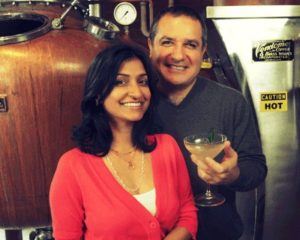
But Melkon and Litty haven’t changed what’s at Greenbar Distillery’s core. Their touchstone throughout the journey is their obsession with flavor. How to find, access, channel, balance and bottle it.
The (now slightly larger than two) production team at Greenbar Distillery chases flavor and whips it into shape any way they can. Like Melkon and Litty, team members are by no means traditionalists. They have no long-lost recipe or spirit-making family heritage to cling to. This means that they’re free to break rules and make new ones. As long as the result taste good.
To this end, they borrow techniques from the California wine industry, like slow, cool fermentation and micro-oxygenation. And they’re inspired by beermaking with its unusual yeast combinations. They look to farmers when choosing whole, organic ingredients instead of artificial flavors. And to engineers for cutting-edge technology, including the first small-scale continuous, infinitely fractionating still.
It’s meaningless, though, if all of the above doesn’t translate into a delightful craft cocktail. If a Greenbar Distillery team member is not sure of the direction a spirit is taking, they always go to the R&D bar (yes, they really have one 🙂 ) and make drinks. They pick the one that tastes the best.
The pursuit of flavor is what drove the talented couple when Melkon was making home infusions to delight a palate of one (Litty’s). It still does today. In the end, that’s what true love is all about.

MEET OUR GREENBAR DISTILLERY FOUNDERS


